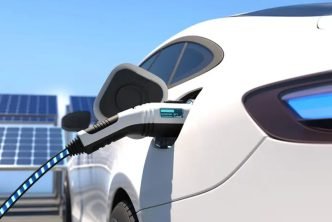Are you ready to embark on a journey towards a greener future? The transition to electric vehicles (EVs) is gaining momentum, and at the heart of this revolution are EV charging stations. These stations play a crucial role in sustainable transportation, addressing the primary concern of range anxiety and encouraging the adoption of EVs.
With the convenience of charging stations, you no longer have to worry about running out of power during your daily commute or long-distance trips. The availability of charging infrastructure gives you the freedom to drive with confidence, knowing that there are numerous charging options along your route.
However, deploying a comprehensive EV charging network is not without its challenges. From the need for investment in infrastructure to the coordination of different stakeholders, there are hurdles to overcome. But with these challenges come opportunities for growth and innovation.
As the demand for EVs continues to rise, the future of EV charging stations looks promising. With advancements in technology and the commitment of governments and companies to sustainability, we are driving towards a greener tomorrow. Join the movement and be a part of the solution by embracing EV charging stations and contributing to a cleaner, more sustainable future.
Table of Contents
The Role of EV Charging Stations in Sustainable Transportation
Imagine how much easier and more convenient your sustainable transportation journey would be if there were more EV charging stations available for you to power up your electric vehicle. Cost-effective solutions are crucial in making EV charging stations more affordable for both consumers and businesses. By implementing innovative technologies and streamlining the installation process, the cost of EV charging infrastructure can be significantly reduced. Integration with renewable energy is another key aspect in driving the transition to a greener future. Powering EV charging stations with sustainable sources such as solar or wind energy not only reduces greenhouse gas emissions but also ensures a cleaner and more sustainable charging process. With more affordable and renewable-powered charging stations, the adoption of electric vehicles will accelerate, leading to a significant reduction in carbon emissions and a more sustainable transportation system.
Addressing Range Anxiety: The Convenience of Charging Stations
Feeling anxious about running out of battery while on the road? Don’t worry! With the convenience of charging stations, you’ll have peace of mind knowing that you can easily power up your vehicle whenever you need to. EV charging stations play a crucial role in addressing range anxiety and ensuring a seamless user experience. These stations are strategically placed in various locations, including public parking lots, shopping centers, and highways, making them easily accessible to EV owners. The convenience factor is further enhanced with the availability of fast-charging stations that can quickly recharge your vehicle in a matter of minutes. Additionally, some charging stations offer amenities such as Wi-Fi, comfortable seating, and refreshments, providing a pleasant experience for drivers during the charging process. With the increasing number of charging stations, the transition to electric vehicles becomes more feasible and convenient for everyone.
Encouraging the Adoption of Electric Vehicles
To accelerate the shift towards electric vehicles, it’s important to incentivize and educate individuals on the benefits of adopting cleaner transportation options. Electric vehicle incentives play a crucial role in encouraging the adoption of electric vehicles. Governments and organizations offer various incentives such as tax credits, rebates, and grants to make electric vehicles more affordable and attractive to potential buyers. These incentives not only reduce the upfront cost of purchasing an electric vehicle but also help to offset the costs of installing home charging stations.
Another key factor in encouraging electric vehicle adoption is infrastructure expansion. The availability of charging stations is essential for addressing range anxiety and ensuring that electric vehicle owners have convenient and reliable access to charging facilities. Governments, utility companies, and private businesses are investing in the development of a robust charging infrastructure, including the establishment of public charging stations in urban areas, along highways, and at workplaces. By expanding the charging network, we can alleviate concerns about range limitations and provide a seamless charging experience for electric vehicle owners.
Challenges in Deploying EV Charging Infrastructure
Despite the progress made in promoting electric vehicles, the deployment of charging infrastructure continues to face significant challenges. Integration challenges and funding hurdles are two key obstacles that need to be addressed in order to accelerate the transition to a greener future. Integrating EV charging stations into existing infrastructure poses a technical challenge, as it requires coordinating with utility companies and ensuring compatibility with different charging standards. Furthermore, the high upfront costs of installing charging infrastructure can be a major deterrent for businesses and individuals. To overcome these challenges, innovative solutions are needed. Governments and private organizations can play a crucial role by providing funding and incentives to support the development of charging infrastructure. Collaboration between stakeholders, such as automakers, utilities, and local governments, is also essential to streamline the deployment process and ensure widespread access to charging stations. By addressing these challenges, we can pave the way for a more sustainable transportation system.
Opportunities for Growth and Innovation in EV Charging
The rapid expansion of electric vehicle adoption is creating exciting opportunities for the development of innovative and convenient solutions to meet the growing demand for accessible and reliable charging options. One such opportunity lies in the integration of EV charging stations with the smart grid. By connecting charging infrastructure to the grid, it becomes possible to efficiently manage the flow of electricity and optimize charging times based on demand and availability of renewable energy sources. This not only improves the overall efficiency of the charging process but also helps reduce strain on the grid during peak hours. Another area of growth and innovation is wireless charging technology. This eliminates the need for physical cables and connectors, making charging even more convenient for EV owners. With ongoing advancements in technology and increasing investments in research and development, the future of EV charging holds immense potential for further growth and innovation.
The Future of EV Charging Stations: A Greener Tomorrow
Imagine a world where our vehicles effortlessly connect to sustainable energy sources, paving the way for a more environmentally friendly tomorrow. The future of EV charging stations holds immense potential for driving the transition to a greener future. One key aspect is smart grid integration, which allows for efficient management and distribution of electricity. By utilizing advanced technology, charging stations can communicate with the grid, optimizing energy usage and reducing strain on the system. Another crucial element is the integration of renewable energy sources into the charging infrastructure. Solar panels and wind turbines can power these stations, reducing reliance on fossil fuels and decreasing greenhouse gas emissions. This combination of smart grid integration and renewable energy sources not only offers a sustainable solution for charging EVs but also contributes to a cleaner and more sustainable energy ecosystem.
Conclusion
In conclusion, EV charging stations play a crucial role in driving the transition to a greener future. They address range anxiety by providing convenient charging options, encouraging the adoption of electric vehicles. Despite challenges in deploying charging infrastructure, there are opportunities for growth and innovation in this sector. By investing in and expanding EV charging networks, we can create a sustainable transportation system that reduces reliance on fossil fuels. With a greener tomorrow in mind, let’s continue to support the development and accessibility of EV charging stations.





